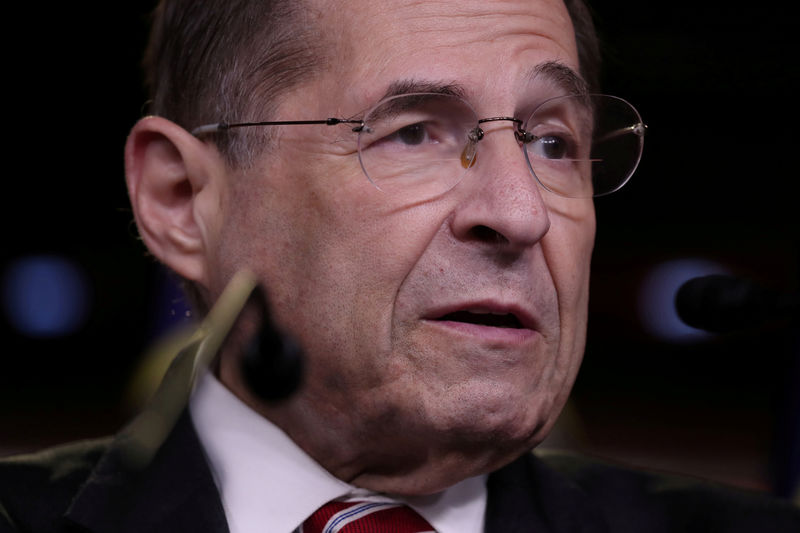By Makini Brice
WASHINGTON (Reuters) - A day before Robert Mueller's eagerly anticipated congressional testimony, a senior Democratic U.S. lawmaker on Tuesday accused President Donald Trump's Justice Department of arrogance in instructing the former special counsel to limit the scope of his remarks and said it lacked the authority for such a directive.
On Wednesday, Mueller is scheduled to appear at back-to-back hearings before the Democratic-led House of Representatives Judiciary and Intelligence committees to discuss his inquiry into Russia's role in the 2016 U.S. election, contacts between the Trump campaign and Moscow, and the Republican president's efforts to impede the investigation.
Associate Deputy Attorney General Bradley Weinsheimer wrote in a letter to Mueller on Monday that the former FBI director's testimony must remain within the boundaries of the 448-page special counsel investigative report the department released in redacted form on April 18.
Weinsheimer wrote that some matters covered by the inquiry were covered by "executive privilege," a legal principle invoked by U.S. presidents to keep other branches of government from getting access to certain internal executive branch information. It generally is used to keep internal discussions between the president and his advisers private.
A spokesman for Mueller, Jim Popkin, said the letter had been received, but declined further comment.
House Judiciary Committee Chairman Jerrold Nadler said Mueller "does not have to comply with that letter.
"He doesn't work for them. And that letter asks things that are beyond the power of the agency to ask even if he still worked for them," Nadler said in a CNN interview.
"I think it's incredibly arrogant of the department to try to instruct him in what to say," Nadler added. "It's part of the ongoing cover-up by the administration to keep information away from the American people."
House Intelligence Committee Chairman Adam Schiff said in a letter to Mueller on Tuesday that he expects the Justice Department letter "will have no bearing on your testimony," NBC News reported.
Schiff said: "The department's attempt to restrict your testimony finds no support in law, regulation or department policy," according to NBC.
Schiff's office did not immediately respond to a request for comment.
Popkin and a House Judiciary Committee staffer both confirmed that Aaron Zebley, the former deputy special counsel who had day-to-day oversight of investigations in the special counsel's office, would accompany Mueller to the hearing.
Zebley is not expected to be sworn in as a witness.
Trump issued a tweet voicing his displeasure with "allowing a Never Trumper attorney to help Robert Mueller with his testimony."
"What a disgrace to our system. Never heard of this before. VERY UNFAIR, SHOULD NOT BE ALLOWED. A rigged Witch Hunt!," he said.
REPUBLICAN CRITICISM
Earlier on Tuesday, the House Judiciary Committee's top Republican, Doug Collins, raised the possibility that Zebley could testify under oath.
Zebley previously served as FBI chief of staff when Mueller was the agency's director.
Both Mueller and Zebley joined the law firm WilmerHale in 2014 after leaving the FBI, and Zebley also previously worked for Mueller doing speechwriting, according to his ethics form filed with the Justice Department.
WilmerHale previously counted the Clinton Foundation among its clients, according to government ethics forms.
That has led some Republicans to criticize the makeup of Mueller's team by saying it contained investigators who were biased from the start against Trump.
The Trump administration previously instructed other former officials not to cooperate with some other congressional investigations.
Democratic lawmakers are expected to try to get Mueller to focus on specific examples of Trump's conduct that they consider improper. Democrats are deeply divided over whether to pursue the impeachment process set out in the U.S. Constitution for removing a president from office.
Mueller's report outlined Russia's actions to interfere in the election with a campaign of hacking and propaganda aimed at boosting Trump's candidacy and detailed the Trump campaign's willingness to benefit from Moscow's actions.
The report said the inquiry found insufficient evidence to conclude that Trump and his 2016 campaign engaged in a criminal conspiracy with Russia despite numerous contacts. The report did not reach a conclusion on whether Trump committed the crime of obstruction of justice but did not exonerate him.

Attorney General William Barr, a Trump appointee, subsequently said the president had not committed obstruction of justice. Long-standing Justice Department policy bars criminal charges against a sitting president.